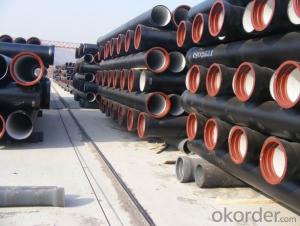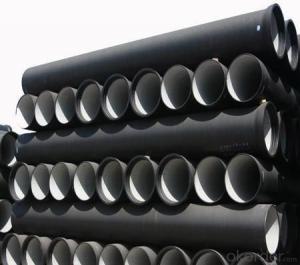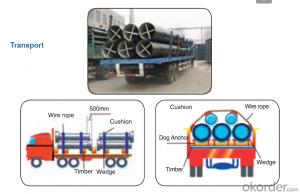Duct Iron Pipe DI Pipe ISO 2531 DN 350-600mm
- Loading Port:
- Tianjin
- Payment Terms:
- TT OR LC
- Min Order Qty:
- 100 m
- Supply Capability:
- 100000 m/month
OKorder Service Pledge
OKorder Financial Service
You Might Also Like
Specification:
1. size : DN80-DN2000 available with PN16 or PN10 or PN25 flanges
2.Standard : ISO2531/EN545/EN598/AWWA standard
3. WRAS Potable Water FBE Internal Lining
4.Material : Ductile iron
5.Technical: Casting
6. Type: Socket / flange PN10 / PN16 / PN25
7. Length=6m, 5.8m
8. Coating: Fusion bonded epoxy to 300 microns Dry Film Thickness
Portland cement lining internally and zinc-rich paint with not less than 70 microns bitumen externally
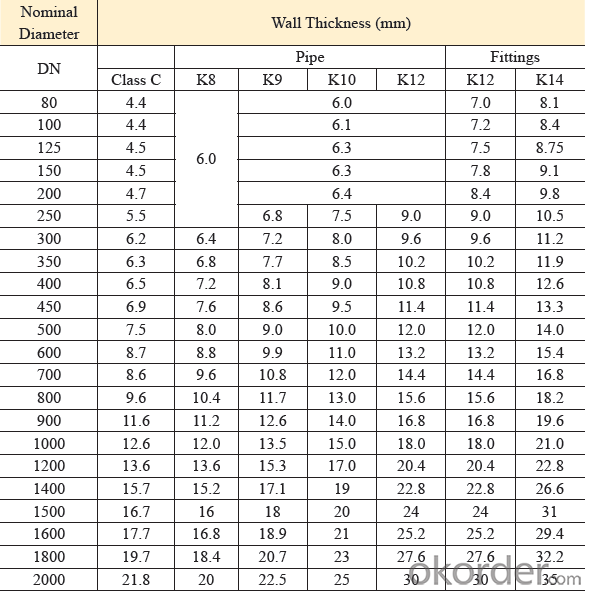
Quality:
ISO 2531 or EN 545 Standard K9 Class, K12 Class
1. ISO 9001 Certificate
2. ISO 2531 & EN 545 Certificate
3. WRAS Potable Water Certificate for FBE Internal Lining
4. WRAS EPDM Rubber Gasket or NBR Rubber Gasket
5. DN80mm - DN2000mm
6. Black Bitumen or Blue FBE / Epoxy Coating
7. Lengh = 6m or cut into 5.6m, 5.7m, 5.8m
8. Client's Brand Customization Allowable
9. Container or Bulk Loading / Shipping
10.Delivery within one Month or According to Client's Order Quantity
11. Support Client or The Third Party Inspection before Shipment
Standard Lining and Coating:
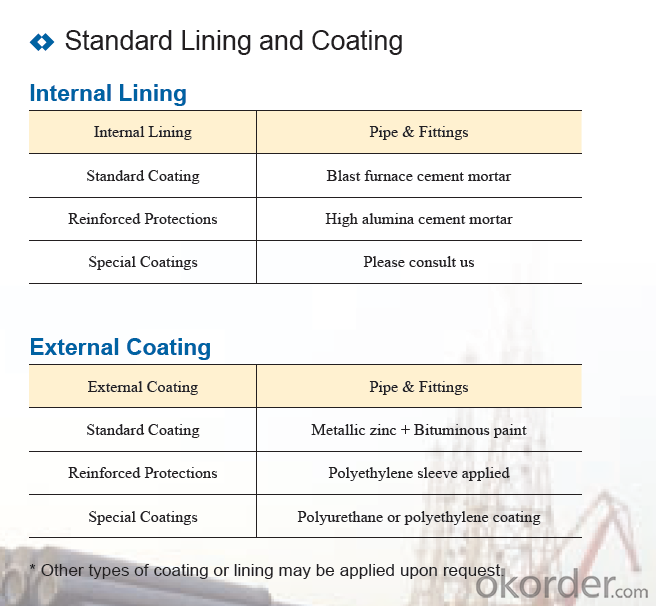
Transport:
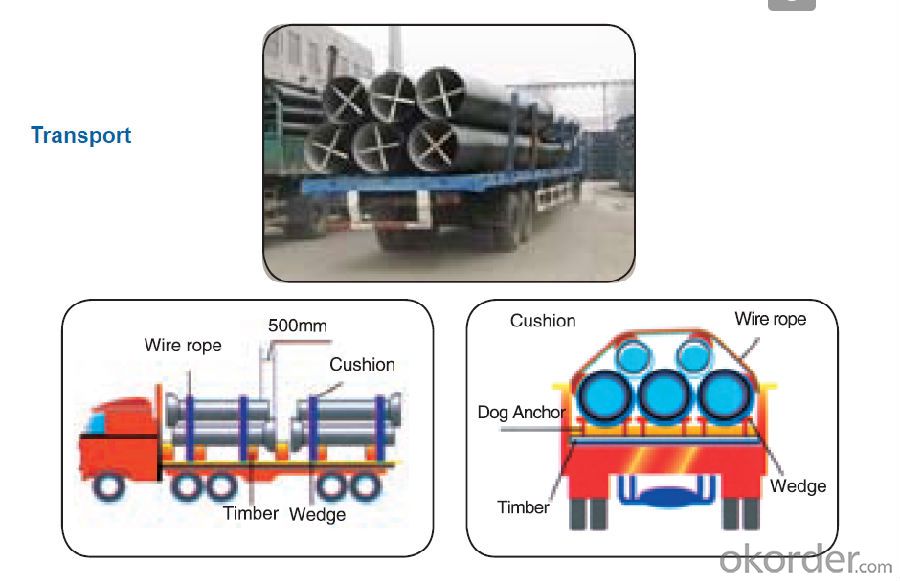
- Q:Can ductile iron pipes be used in contaminated groundwater systems?
- Contaminated groundwater systems can indeed utilize ductile iron pipes. Renowned for their strength and durability, ductile iron pipes are versatile and applicable in various settings, including water and wastewater systems. These pipes possess corrosion-resistant properties that safeguard against both internal and external corrosion, thus ensuring reliable water transportation, even in the presence of contaminated groundwater. When addressing contaminated groundwater, it becomes imperative to assess the extent and nature of the contamination. Ductile iron pipes exhibit resistance to numerous common chemicals typically found in groundwater, including specific acids and alkalis. However, in instances of severe or specific chemical contamination, it may be necessary to explore alternative pipe materials that offer superior resistance to those particular substances. Moreover, the proper installation and maintenance of ductile iron pipes are vital for their long-term performance within contaminated groundwater systems. Regular inspections, cleaning, and the use of suitable protective coatings can effectively mitigate any potential risks associated with contamination. In conclusion, ductile iron pipes can be effectively employed in contaminated groundwater systems, provided that the level and type of contamination fall within acceptable limits and appropriate installation and maintenance practices are observed. It is always advisable to seek guidance from experts and consider local regulations and guidelines when determining the suitability of pipe materials in specific groundwater systems.
- Q:Can ductile iron pipes be used for river crossings?
- Yes, ductile iron pipes can be used for river crossings. Ductile iron is a strong and durable material that is capable of withstanding the pressure and stress of being buried and crossed by a river. It is commonly used for various applications, including water and sewage systems, and has been proven to be reliable for river crossings. However, it is important to consider other factors such as the depth of the river, the size and weight of the pipes, and the installation process to ensure the proper design and installation of the ductile iron pipes for river crossings.
- Q:Is the cast iron pipe buried in need of antiseptic treatment? What kind of anticorrosive materials are used?
- Is to put the pipe surface rust corrosion, polished clean, brush again primer, and then wrapped a layer of glass cloth wrapped paint, two layers of glass cloth on the line, the thickness of not less than 6mm, painted with epoxy coal tar paint or asphalt paint
- Q:Are ductile iron pipes suitable for use in chemical storage tanks?
- Ductile iron pipes are not suitable for use in chemical storage tanks. While ductile iron pipes have excellent mechanical properties, including high tensile strength and impact resistance, they are not resistant to corrosion caused by various chemicals. Chemical storage tanks require materials that can withstand the corrosive properties of the stored chemicals to ensure the safety and integrity of the tank. Therefore, materials such as fiberglass-reinforced plastic (FRP), stainless steel, or high-density polyethylene (HDPE) are commonly used for chemical storage tanks due to their superior corrosion resistance. It is crucial to select the appropriate material for chemical storage tanks to prevent leaks, contamination, and potential hazards.
- Q:Are ductile iron pipes suitable for water distribution networks?
- Yes, ductile iron pipes are highly suitable for water distribution networks. They possess excellent strength, durability, and corrosion resistance, making them ideal for carrying and delivering water over long distances. Additionally, their flexibility allows for easy installation and adaptability to various terrains, ensuring reliable and efficient water distribution.
- Q:Can ductile iron pipe be used for irrigation systems?
- Yes, ductile iron pipe can be used for irrigation systems. Ductile iron is a strong and durable material that can withstand the high pressure and constant flow of water required for irrigation systems. It is resistant to corrosion, making it suitable for underground applications where it may come into contact with moisture and soil. Additionally, ductile iron pipes have the advantage of being able to handle heavy loads, which is important for irrigation systems that may require the use of heavy machinery or vehicles. Overall, ductile iron pipe is a reliable and long-lasting choice for irrigation systems.
- Q:What is the internal lining used in ductile iron pipes?
- The internal lining used in ductile iron pipes is typically a cement mortar lining.
- Q:What is the expected deflection capability of ductile iron pipes?
- Compared to other pipe materials, ductile iron pipes typically have a high expected deflection capability. These pipes possess a flexible nature that enables them to withstand external loads and stresses without breaking or cracking. This flexibility allows the pipes to deflect under pressure, absorbing and evenly distributing the force along their length. Factors such as pipe diameter, wall thickness, and soil conditions can influence the specific deflection capability of ductile iron pipes. However, in general, these pipes can typically deflect up to 2% to 5% of their diameter without causing significant damage or compromising structural integrity. This deflection capability allows the pipes to adapt to ground movement, thermal expansion, and other external forces, making them highly resilient and reliable for various applications. It is important to consider the deflection capability of ductile iron pipes in conjunction with other design criteria, such as pipe burial depth, trench width, and backfill material. By following proper installation practices and adhering to industry standards and specifications, the expected deflection capability of ductile iron pipes can be optimized and maintained throughout their service life.
- Q:How do ductile iron pipes compare to PVC pipes in terms of strength?
- PVC pipes are generally considered to be less strong than ductile iron pipes. Ductile iron, a type of cast iron, is strengthened and made more flexible through the addition of small amounts of magnesium. This treatment enhances its resistance to cracking and breaking under pressure, making it suitable for various applications including water and wastewater transportation. In contrast, PVC pipes are made from a plastic known as polyvinyl chloride. While PVC pipes are relatively durable, they do not possess the same level of strength as ductile iron pipes. They are more susceptible to cracking and breaking when subjected to high pressure or extreme temperature changes. PVC pipes are commonly utilized in low-pressure systems such as irrigation and drainage. In terms of strength, ductile iron pipes exhibit greater tensile strength and can endure higher internal and external pressures compared to PVC pipes. Additionally, ductile iron pipes have a higher resistance to impacts, reducing the likelihood of damage from external forces like heavy machinery or accidental impacts. However, it is important to consider specific project requirements when choosing between ductile iron and PVC pipes. Factors such as cost, ease of installation, corrosion resistance, and the nature of the fluid being transported should all be taken into account.
- Q:How is ductile iron pipe manufactured?
- Ductile iron pipe is manufactured through a specific process known as centrifugal casting. The process starts with the melting of iron in a furnace, where specific elements such as carbon and silicon are added to achieve the desired properties. Once the iron is melted, it is poured into a spinning mold or a die that is rotating at a high speed. As the molten iron is poured into the rotating mold, centrifugal force pushes the liquid metal towards the inner surface of the mold. This force causes the metal to solidify from the outer surface inward. This results in a pipe with a dense outer layer and a more porous inner layer. The centrifugal casting process ensures that the pipe's outer surface is free from impurities and defects, ensuring its strength and durability. After the pipe has solidified, it is removed from the mold and undergoes further processing. The pipe is cleaned, excess material is trimmed off, and any surface imperfections are removed. It is then treated with a protective coating, such as zinc or epoxy, to enhance its corrosion resistance. The final step in the manufacturing process is quality control and testing. Ductile iron pipes are subjected to various tests to ensure they meet the required standards, including hydrostatic pressure testing, dimensional inspection, and internal and external coating inspection. In summary, ductile iron pipe is manufactured through the centrifugal casting process, which involves melting iron, pouring it into a rotating mold, and allowing it to solidify under centrifugal force. The resulting pipe is then cleaned, coated, and undergoes rigorous quality control to ensure its strength, durability, and adherence to standards.
1. Manufacturer Overview |
|
|---|---|
| Location | |
| Year Established | |
| Annual Output Value | |
| Main Markets | |
| Company Certifications | |
2. Manufacturer Certificates |
|
|---|---|
| a) Certification Name | |
| Range | |
| Reference | |
| Validity Period | |
3. Manufacturer Capability |
|
|---|---|
| a)Trade Capacity | |
| Nearest Port | |
| Export Percentage | |
| No.of Employees in Trade Department | |
| Language Spoken: | |
| b)Factory Information | |
| Factory Size: | |
| No. of Production Lines | |
| Contract Manufacturing | |
| Product Price Range | |
Send your message to us
Duct Iron Pipe DI Pipe ISO 2531 DN 350-600mm
- Loading Port:
- Tianjin
- Payment Terms:
- TT OR LC
- Min Order Qty:
- 100 m
- Supply Capability:
- 100000 m/month
OKorder Service Pledge
OKorder Financial Service
Similar products
New products
Hot products
Related keywords
